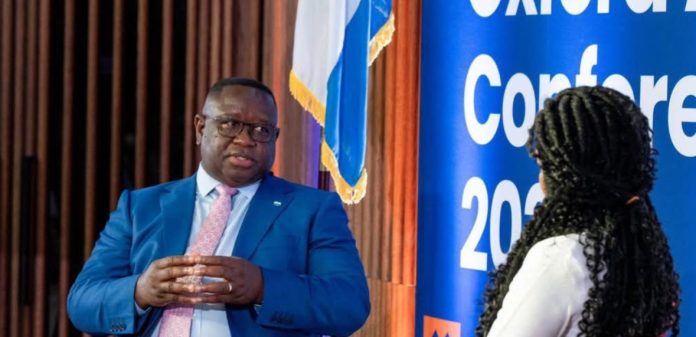Abu Bakarr Kargbo
On the eve of Africa Day, a landmark gathering of leaders, scholars, and advocates convened at the prestigious Oxford Africa Conference 2025, igniting a powerful dialogue on the continent’s future. Standing as a beacon of hope for a continent yearning for recognition and empowerment was Sierra Leone’s President Julius Maada Bio. His passionate keynote address resonated deeply with attendees and observers alike, emphasising the urgent need for Africa to reclaim ownership of its narrative and resources.
In his speech, President Bio underscored the theme “Changing Narrative: Vision, Action, and Transformation of Africa,” challenging persistent global depictions of Africa as a place defined by “dependency, conflict, and underdevelopment.” He voiced a clarion call for both internal and external stakeholders to reassess how Africa is represented on the world stage. “For centuries, Africa’s story has been told by outsiders,” he asserted. “These external narratives have shaped global perceptions and, more dangerously, how we perceive ourselves.” This profound call for reclamation and empowerment resonated particularly with Sierra Leoneans who have long felt marginalised by foreign exploitation of their nation’s vast resources.
The significance of President Bio’s message was not lost on the audience back home in Sierra Leone. Recent trends reflect a growing awareness among the citizenry regarding the management of their nation’s wealth, particularly in the mining sector. Foreign-owned companies, which dominate this space, often extract significant profits while local communities suffer from marginalisation and poverty. Citizens are now rallying behind President Bio’s vision, urging his administration to transform his words into action that enables local management of resources.
This rising sentiment is fueled by historical examples of effective local leadership that successfully stabilised and grew the economy. Figures like the late Moseray Fadika, who once managed African Minerals Limited, and John Bonnoh Sesay, who led Sierra Rutiles Limited, are heralded as models for what can be achieved when citizens lead their industries. Under their leadership, Sierra Leone experienced appreciable economic growth, positioning it as one of the fastest-growing economies globally during that period.
Now, as Sierra Leone grapples with currency depreciation and economic instability, citizens increasingly articulate the need for a systemic overhaul of resource management, echoing President Bio’s urgency. Advocates for local management argue that empowering local investors could drastically improve economic conditions, creating jobs, fostering entrepreneurship, and enhancing the overall standard of living.
A prime example of successful local investment comes from Allieu Malador, CEO of Malador Associates. His trajectory—transitioning from supplying fuel to Shandong Steel Limited to owning and managing his own petroleum business—illustrates what can happen when Sierra Leoneans are allowed to lead and invest in their resources. Conversely, foreign entities like Leone Rock Metal Group, Marampa Mines, and Koidu Limited frequently face accusations of exploitative practices. Reports indicate a stark disregard for local governance structures, highlighted by disparaging remarks from a CEO of one of these companies who dismissed ministers as “useless.” Such comments reveal not only a lack of respect for Sierra Leonean leadership but also underscore the critical need for a shift toward local resource management.
As citizens express their desire for systemic change, calls for action are resonating throughout the fabric of governance, from cabinet ministers to civic leaders. Many are urging a collective effort towards reclaiming the nation’s resources, prioritising local investors, and ensuring the benefits are reinvested into communities that have endured years of exploitation. The challenge for the government lies in transforming President Bio’s empowering words into tangible actions that align with the aspirations of the people.
The immediate response in Sierra Leone was electric. Social media platforms buzzed with messages of support and admiration for President Bio’s bold stance. Celebrations erupted in major cities across the country as citizens expressed pride in their identity and renewed hope for the future. President Bio’s address was hailed as a pivotal moment of African unity and a significant step towards reclaiming the continent’s narrative.
Many Sierra Leoneans perceived the speech as validation of their experiences and aspirations. For far too long, they have felt the sting of misrepresentation and the frustration of seeing their country portrayed through a lens of negativity and underdevelopment. The President’s words offered a powerful counter-narrative, shining light on the potential for empowerment and self-determination.
The impact of his speech transcended celebrations; it galvanised a renewed sense of national purpose and inspired discussions about how Sierra Leone can play a crucial role in the broader effort to reshape Africa’s narrative. Many citizens pledged to actively engage in dialogues surrounding their country and continent, aiming for a representation that is both accurate and empowering.
The Oxford Africa Conference 2025, particularly President Bio’s address, marks a turning point not just for Sierra Leone but for the entire African continent. It symbolised a rallying cry, igniting a determination to reclaim Africa’s God-given resources.

